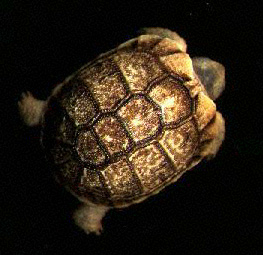
August 21st, 1999 - 182 Babies and still hatching!
TortoiseCare, a program for the captive breeding and reintroduction of
the Egyptian Tortoise is going well.
Ms. Esther Wenman and Dr. Gian Lorenzo D'alterio, Zoological Society
of London (ZSL) visited Egypt in May 1999 to help with the project.
There was a visit to the Zaranik Protected Area to monitor the radio
tagged animals and release further animals into the enclosures. There
are now a total of 50 animals at Zaranik, including the 9 radio tagged
tortoises on the island. There was a drought in North Sinai this year
and the natural vegetation is quite poor. The animals in the enclosures
are not effected by the drought as the vegetation is regularly watered.
The animals are healthy and have gained weight. Two eggs were found in
the enclosure and more are expected to have been laid. The radio
tracking receiver is still not functioning properly so locating the
animals on the island is difficult. After two days and more than seven
hours of searching, a female was finally located walking in the open.
She was found to be in good health and heavier. It is assumed that the
other animals had burrowed under the bushes to escape the heat.
An enclosure was built at a farm in the desert near Cairo owned by Wadi
Foods, a leading Egyptian company producing olive products. The
TortoiseCare team visited the farm to landscape the tortoise holding
facility. 40 Egyptian Tortoise and two Greek Tortoises were released
into the enclosure, which still needs more vegetation before it can
accommodate additional tortoises.
The Sekem Initiative also agreed to host a tortoise enclosure at their
farm near Ismaliya. Sekem is a NGO-company that is a pioneer in the
field of organic farming in Egypt. Funds have been provided to them by
TortoiseCare to construct the enclosure, which should be finished
shortly.
Ms. Koari Odani, the tortoise keeper financed by the Tortoise Trust is
doing an excellent job with the animals. Over 300 eggs were laid at the
rooftop facility this year. Of these 182 have hatched, with more
hatching every day. Due to her diligent care, the adult animals and
babies are in excellent condition. Esther and Gian Lorenzo in
cooperation with Kaori gave the tortoises shots in an attempt to stamp
out the Runny Noise Syndrome, which has persisted since their
confiscation over two years ago.
The website constructed
with the help of the Tortoise Trust, continues to generate awareness about
the species and foster contacts with other concerned organizations and
individuals. Many people from Egypt and abroad have contacted us to
ask questions about Egyptian Tortoise husbandry and treatment.
The education and promotional materials for TortoiseCare have been
produced and distributed. There are T-shirts, stickers, posters, fliers
and brochures. Materials have been given to the office of the Minister
of State for Environment, Nadia Makram Abeid for distribution as she has
a special interest in environmental education and nature conservation.
These materials are important tools to help raise awareness about the
species and conservation efforts.
A community development program for the Bedouins living
near Zaranik was also launched. The women were given supplies to
produce traditional handicrafts, embroidery and beadwork in tortoise
motifs that will be sold to generate supplementary income for the
women. Some lovely hand-made items have been produced and we are
optimistic that there will be a demand for these products. The
Marketing Link Egyptian Craft Center has volunteered to help us with
this program and will sell crafts, and arrange with their cooperatives
in North Sinai to produce more goods and train women at Zaranik to
improve the quality of their products.
The response to the program has been good and there is heighten
awareness nationally and internationally about the plight of species.
Still, more efforts are needed to insure a sustainable future for the
Egyptian Tortoise, but the first step must be taken before you can run.
That step has been made thanks to the calibration and efforts of all
participating bodies and individuals. The Development Cooperation
Division of the Royal Netherlands Embassy in Cairo though deserves a
special note of gratitude for the providing the financial support for
this pilot program, without which none of the above achievements would
be possible. Special thanks to Mr. Jacob Rooimans, who had been
in-charge of project supervision at the Embassy for his constant support
and assistance. He returned back to the Netherlands this summer and we
wish him the very best in all his endeavors.
Finally, we wish to congratulate our partner, American Community College
(CAC) on the hatching of their first baby tortoise. CAC maintains a
tortoise population of over 120 Egyptian tortoises both for conservation
and education purposes. KIDS WAY TO GO!
